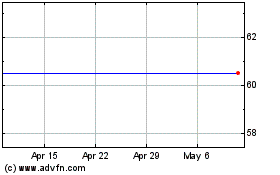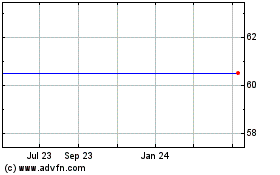By Saabira Chaudhuri and Ben Dummett
LONDON -- Kraft Heinz Co. dropped its $143 billion offer for
rival Unilever PLC, just a little more than 48 hours after making
an audacious bid to combine two of the world's biggest
packaged-food companies.
In a brief statement Sunday, Kraft said it "has amicably agreed
to withdraw its proposal."
A Kraft spokesman said the company's intention was to proceed on
a friendly basis, and that its interest was made public at "an
extremely early stage." After Unilever made clear it didn't want to
pursue a tie-up, "it was best to step away early so both companies
can focus on their own independent plans to generate value," the
spokesman said.
Kraft's withdrawal came after Unilever spent the last 10 days
telling its suitor that the deal didn't make strategic sense given
the companies' different business models, a person familiar with
the matter said. Kraft's interest became public on Friday.
Unilever argued its growth prospects lie in part with investing
in its home and personal-care offerings, a business Kraft doesn't
have, this person said. Kraft, meanwhile, has been focused on
cutting costs to boost earnings.
Kraft initially believed that Unilever's opposition centered
mostly on price, and negotiations on that issue could lead to an
agreement, the person said. But Kraft backed off after it became
clear a difference over strategy was the major stumbling block, the
person said.
The U-turn is a blow for Kraft, where progress in improving
profitability through savings was slowing. The company, like other
big food makers, has struggled with sales declines in the U.S. and
Europe, where consumers are buying food they view as fresher and
more natural. Despite reporting quarterly earnings this month that
beat Wall Street expectations, cost cuts weren't as dramatic as
some investors anticipated, pressuring Kraft's stock.
For Unilever Chief Executive Paul Polman, Kraft's retreat is a
big victory. Mr. Polman was digging in over the weekend to resist
the unsolicited offer.
The deal faced steep hurdles from the start. First among them
was a determination by Unilever's board and management that the 18%
premium Kraft offered to the company's value was significantly
inadequate.
Mr. Polman was ramping up a defense, telling board members and
investors that Kraft's cost-cutting ethos could damage Unilever
brands and highlighting its lack of experience in personal-care and
household goods, according to people familiar with the matter.
While price remained key, Mr. Polman also wanted to protect
Unilever's reputation for promoting sustainability initiatives,
including environmental and human-rights efforts, according to
people familiar with the matter. Some investors have complained in
the past that Mr. Polman has spent too much time on those efforts,
instead of focusing on returns. Supporters say the efforts help, in
part by attracting stronger talent.
In its statement, Kraft said it has the "utmost respect for the
culture, strategy and leadership" of Unilever.
Unilever's board had been considering meeting as early as this
week, but serious discussions about Kraft's approach weren't likely
without a higher price, according to one person familiar with the
matter.
Valuation aside, 3G Capital Partners LP, which orchestrated the
2015 merger of Kraft and Heinz with Warren Buffett and remains
Kraft's biggest shareholder, faced a host of other hurdles that
made a deal complicated to pull off. Unilever maintains a dual
structure in the U.K. and the Netherlands that gives governments,
regulators, certain shareholders and other stakeholders outsize
say.
In the Netherlands, the company's European Works Council,
composed of worker representatives, must be kept apprised of deal
developments. While it probably couldn't have prevented a deal from
happening, labor opposition could have triggered closer scrutiny by
the government at a time when the Netherlands is gearing up for an
election.
Meanwhile, two big institutional investors in the Netherlands
were set to play an important role, and their sentiment over the
deal was uncertain. Insurers NN Group NV and ASR Nederland NV,
which is majority owned by the Dutch government, together account
for about 20% of the voting rights in Unilever NV, the Dutch arm,
according to a person familiar with the holdings. That translates
into roughly 8% of the voting rights at Unilever as a whole.
In the U.K., the Leverhulme Trust, a research-focused charity,
owns over 5% of the British arm of the company, according to
FactSet. The trust was set up in 1925 by William Hesketh Lever, the
founder of Lever Bros., which merged with a Dutch margarine maker
to form Unilever. The trust's board includes Mr. Polman and two
former Unilever CEOs. A trust representative didn't immediately
respond to a request for comment.
None of these investors likely could have blocked the deal on
their own, but they would have been important allies for Mr. Polman
-- or possibly even Kraft -- in any protracted standoff.
Kraft also faced potential hurdles at No. 10 Downing Street.
Last year, during her leadership race, U.K. Prime Minister Theresa
May specifically cited what critics have called broken promises
over jobs by Kraft when it bought British chocolate maker Cadbury
in 2010. That deal forced stricter oversight of takeovers,
requiring more transparent disclosures in areas like job cuts.
When Pfizer Inc. made an unsolicited $120 billion bid for
AstraZeneca PLC in 2014, the deal attracted heated criticism in the
U.K. over potential job losses and the deal's structure, which
would have moved Pfizer's tax home to Britain, where taxes are
lower. AstraZeneca dug in its heels, and Pfizer walked away.
Mrs. May's government was scrutinizing what a Kraft-Unilever
deal would mean for the British economy, a U.K. government official
said Sunday, and whether the deal merited government intervention.
The official said this is standard procedure for a proposed deal of
this kind.
Mr. Polman is a consumer-goods veteran, who worked at Procter
& Gamble Co. and Nestlé SA before becoming Unilever's CEO in
2009. Last week, after learning of the surprise bid, he pushed
ahead with a visit to Unilever's Asian headquarters in Singapore.
He rallied management in the face of the bid, according to people
familiar with the matter, while signing off on the hiring of an
array of legal, financial and other advisers.
On Friday, the day news of Kraft's approach became public, Mr.
Polman met with Vietnam's prime minister, smiling and seemingly
unfazed in front of reporters. He returned to London from Vietnam
over the weekend.
Jenny Gross contributed to this article
Write to Saabira Chaudhuri at saabira.chaudhuri@wsj.com and Ben
Dummett at ben.dummett@wsj.com
(END) Dow Jones Newswires
February 19, 2017 15:19 ET (20:19 GMT)
Copyright (c) 2017 Dow Jones & Company, Inc.
Unilever NV (NYSE:UN)
Historical Stock Chart
From Mar 2024 to Apr 2024

Unilever NV (NYSE:UN)
Historical Stock Chart
From Apr 2023 to Apr 2024
